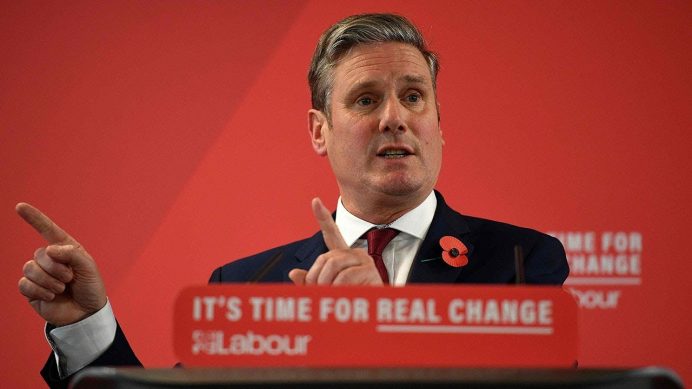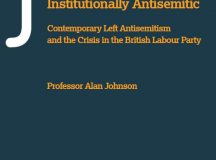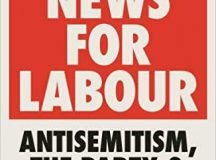Sir Keir Starmer has been elected as the British Labour Party’s new Leader. Luke Akehurst, a former member of the party’s National Executive Committee and Director of We Believe in Israel, assesses what his victory will mean for the party’s recent catastrophic relationship with British Jews, its hostile stance towards Israel and the antisemitism scandal of the Corbyn years.
Who is Keir Starmer?
It’s important to understand that Keir Starmer does not fit neatly into any of the ideological or tribal boxes within the Labour Party.
Because he was prohibited from any form of political activity for five years at the peak of his legal career while he was Director of Public Prosecutions (DPP), he hasn’t left many footprints about his attitudes, and didn’t form alliances or make enemies in the party before entering the House of Commons.
He won selection for his constituency of Holborn and St Pancras based on his record of politically neutral public service, rather than through factional backing. Having said that, he did present himself as the ‘left’ candidate in the constituency selection, outflanking the more overtly Blairite then local Camden Council Leader, Sarah Hayward. But since winning he has been perceived locally to have quietly backed the recapture of his Constituency Labour Party (CLP) by Corbyn-sceptics, and its conversion into something of a moderate bastion. The Camden branch of the pro-Corbyn Momentum faction feels strongly enough to issue a public statement saying ‘he has not sought to engage with, encourage or welcome the left at the local level. In Holborn and St Pancras, he has built a team around him that has worked tirelessly to marginalise the left within the CLP, yet he now calls for an end to “factionalism”.’
In the CLP, Starmer has been closely allied with the current Camden Council Leader, Georgia Gould, whose advice he values. She was one of the key speakers at his largest campaign rally. She is a member of the Jewish Labour Movement, is perceived as a Blairite and is the daughter of the late Philip Gould, Lord Gould of Brookwood, an adviser and pollster to Tony Blair, and the publisher Gail Rebuck, Baroness Rebuck, who is Jewish.
The campaign team that has taken Starmer across the line in the leadership contest and will likely be given key roles in the Leader’s Office has been carefully balanced between left and right of the party to reflect in practice his rhetoric about party unity and moving on from the factionalism of the 2015-2020 period. It can broadly be described as consisting of three groups. There is a cohort of younger staff with policy and media skills who already worked for Starmer before the campaign and have never been involved in Labour infighting. From the left, there are figures including Simon Fletcher, who grew up in the Trotskyist Socialist Action grouping and was Chief of Staff to Ken Livingstone when he was Mayor of London. Fletcher’s politics on Israel and Jewish issues are more nuanced than this background might suggest though, as his ex-wife was Jewish and he knows Israel first-hand from family holidays there. Kat Fletcher (no relation), is also from the left of the party, and was NUS President and worked on Jeremy Corbyn’s 2015 campaign before being side-lined by more hard-line Corbyn advisers. Her position on Israel is also likely to be more nuanced than this might suggest, as she was once a member of Alliance for Workers’ Liberty, a small Trotskyist group which makes a point of vigorously opposing antisemitism and being sympathetic towards Zionism. From the right of the party, personnel have included the campaign’s Chair, Jenny Chapman, MP for Darlington from 2010-2019; Matt Pound, National Organiser of moderate faction Labour First from 2017-2019; and Morgan McSweeney, the Campaign Manager, who previously ran Blairite candidate Liz Kendall’s bid in 2015.
McSweeney will be a pivotal figure for dealing with Labour’s antisemitism crisis. He is likely to become Chief of Staff in the Leader’s office and take on tackling antisemitism as a priority task. He is personally committed to dealing with this issue and rebuilding the party’s relationship with the Jewish Community, and is a solid supporter of Israel, though his discreet political style means he hasn’t been publicly outspoken.
Pinning down Starmer’s own politics is difficult because he genuinely isn’t affiliated to either the organised left or organised right of the party, and because he hadn’t, prior to the leadership election, had the opportunity to set out his own stance on issues as he went almost straight from his politically neutral role as DPP to being a shadow minster, so was prevented by collective responsibility from expressing his personal views.
As a young man he was heavily involved in the Labour Party Young Socialists (LPYS) in his home area in Reigate, Surrey, and then Oxford University Labour Club. He was neither part of the dominant Militant faction in LPYS nor the moderate grouping that ran Labour Students, but instead was on the Editorial Board of an obscure group called Socialist Alternatives, which had evolved from Trotskyism to red/green politics along with its mentor, Michel Pablo.
In the 1980s and 90s, the young Starmer was clearly part of the extra-parliamentary left of the Labour Party as a campaigner and protester. He gave pro-bono legal advice to causes including the striking trade unionists in the P&O and Wapping print disputes, the anti-Poll Tax protesters the National Union of Mineworkers over the 1992 pit closures, the Twyford Down M3 protests, the protesters at the US Menwith Hill base, Greenpeace over Shell sinking the Brent Spar oil platform, and the McLibel defendants.
In 2003 he published a legal opinion in the Guardian that the Iraq War was illegal.
His campaign launch video cited all these examples of left-wing causes he had actively supported. It implies a support for the Palestinian cause by saying ‘we can promote peace and justice around the world with a human rights based foreign policy’ over a fleeting image of Stop the War marchers with a large Palestinian flag. This was clearly an image chosen to insinuate a position, but it isn’t backed up by a concrete example in the way all the other causes cited are.
As an MP, Starmer has first held a shadow Home Office brief and then been Shadow Brexit Secretary, so he hasn’t had the opportunity to speak about the Middle East, or even to sign any Early Day Motions that might indicate his position.
He is listed as a parliamentary supporter of Labour Friends of Palestine and the Middle East (LFPME) but not Labour Friends of Israel (LFI), but this doesn’t necessarily indicate a particular radicalism on the issue.
Starmer and Labour Antisemitism
In contrast to his silence on the Middle East, Starmer did speak out twice on antisemitism even though he was technically bound by Shadow Cabinet collective responsibility. These were very deliberate interventions, briefed to the press, to distance himself from the Corbyn line on the issue.
In July 2018, when the party leadership was trying to avoid signing up to all the examples in the International Holocaust Remembrance Alliance definition of antisemitism, Starmer gave an interview on the BBC’s Andrew Marr Show where he said:
‘I believe in the full definition. Councils, institutions across the country have accepted the full definition. I think that’s the right position to be in.’
Asked by Marr why Labour had not adopted the full definition, he said: ‘There’s some argument as to whether Labour has or hasn’t, but I would urge everybody within the Labour Party to listen to the voices that have come out in recent days and get to a position where we are supporting the full definition.’
‘I think it’s really important, including the examples. We have to be very clear about our position on this.’
‘I think we need to reflect on what’s been said in the last few days and if we are not in a position of supporting the full definition we need to get into that position – and sharpish.’
Exactly a year later, just before the BBC Panorama programme on Labour antisemitism, Starmer gave an interview on the BBC Radio 4 Today programme where he said, referring to the Equality and Human Rights Commission (EHRC) inquiry into the party:
‘We should throw open the books and say you have got access to anything. You have got access to any member of staff,’
‘We have made some process changes which have improved things but we have still got a problem. Help us through it. Many organisations circle the wagons when they are challenged and that is the wrong approach. We have got to be very, very open.’
More significantly, he called for ‘decisive action’, including automatic expulsion in clear cases:
‘Firstly, I would support a rule change that says you expel in clear cases of antisemitism automatically, just as we do for people who support another political party an election,’
‘Secondly, be very clear if you deny we’ve got a problem. That’s part of the problem.’
Starmer’s firm position on the issue stems from three factors: his background as a lawyer and concern to see proper process on disciplinary cases rather than factional interference in them; his record as a human rights campaigner who has been heavily involved in issues around tackling racism and discrimination; and a personal understanding of Jewish concerns about antisemitism. Whilst Starmer isn’t Jewish himself, his wife Victoria Alexander comes from a Jewish family.
Starmer told the Jewish Chronicle in March that the family have Friday Night dinners, that he felt comfortable attending family Jewish ‘barmitzvahs, weddings, and funerals’ and that he had ‘had “no issue” with standing for the traditional toast to the president of the state of Israel at Jewish weddings’. He told the Jewish Chronicle that he had ‘visited some of London’s major synagogues — often for family occasions such as a recent barmitzvah in Hendon. There are also more spontaneous visits, such as the one he made to South Hampstead shul after the nearby antisemitic graffiti incidents in December.’
In the same interview he confirmed he had a number of members of his extended family living in Tel Aviv.
To all these personal factors will be added the electoral imperative of dealing with an issue that has caused immense reputational damage to the Labour Party.
Starmer’s wider relationship with former leader Jeremy Corbyn and the Corbyn project was one of never being a signed-up supporter, of being perceived as manoeuvring against the Leader’s office on Brexit policy, but never making a complete break with and frontal attack on Corbyn. He appears to have calculated after Owen Smith’s defeat by Corbyn in 2016 that the key to winning the succession as leader was to win over ‘soft’ supporters of Corbyn who admired the man personally, wanted to see loyalty to him, but were not factional supporters of the ‘hard left’ and had policy disagreements with Corbyn, particularly on Europe. He correctly judged that only someone who had served in the Shadow Cabinet would pass muster for this critical group of party members.
Starmer nominated Andy Burnham in 2015 and Owen Smith in 2016. He resigned as a Shadow Minister in the 2016 ‘coup’ against Corbyn but accepted a promotion to the Shadow Cabinet that October, thereafter acting as the Shadow Cabinet champion of Labour’s Remainers.
In his campaign manifesto, Starmer makes a specific pledge about toughening up Labour’s disciplinary process, which fits with key demands from the Jewish Labour Movement (JLM) and the major Jewish communal organisations:
‘Scrap the NCC (National Constitutional Committee) and create an independent body to deal with complaints. When complaints are made all involved including the complainant must have confidence in the system. Our current system does not work to this principle and it should be replaced by an independent panel with experts on racism, sexual harassment and poor personal conduct cases. All members and communities must have confidence in the rigour and independence of our disciplinary procedures. We should extend auto-exclusion to include expressions of clear-cut racism including antisemitism.’
During the leadership campaign there were two set piece instances where the candidates were put on the spot about their views on Israel.
At the JLM hustings on 13 February 2020, Starmer acquitted himself well on the antisemitism questions, but was less robust in his rhetoric than his rival Lisa Nandy, who got a very warm reception from the audience. Nandy, despite her long-term advocacy on Palestinian rights and role as national Chair of LFPME, was an outspoken backbench critic of Corbyn’s failings on antisemitism and went on to win JLM’s formal nomination.
The candidates were then asked whether they considered themselves to be Zionists.
Nandy said ‘I believe Jewish people have a right to national self-determination. That makes me a Zionist.’
Emily Thornberry said, ‘I believe in the state of Israel so therefore I am a Zionist’.
Surprisingly, Rebecca Long-Bailey, the standard-bearer for the Corbynite ‘hard left,’ said ‘I also agree with a secure Israel and I also agree with a two-state solution, I suppose that makes me a Zionist because I agree with Israel’s right to exist and self-determine.’
Starmer was the only candidate not to use this self-description. He expressed support for a ‘secure Israel’ and an ‘independent Palestinian state’ and when pressed on whether this made him a Zionist, said:
‘I don’t know how many people know this – my wife’s family are Jewish and we have got extended family in Israel. I don’t describe myself as a Zionist but I understand and I sympathise and I support Zionism. I wouldn’t describe myself in that way – but of course we have family in Israel and that is part of my family.’
A few days later, this pattern was reversed when the Palestine Solidarity Campaign (PSC) asked the candidates to sign the following pledges:
‘To oppose any proposed solution for Palestinians, including Trump’s ‘deal’, not based on international law and UN resolutions recognising their collective rights to self-determination and to return to their homes.
To adhere to a consistent ethical UK trade policy, including in relation to Israel, in particular by applying international law on settlements in the occupied Palestinian territories and stopping any arms trade with Israel that is used in violation of the human rights of Palestinians.
To oppose the government’s proposed restrictive legislation regarding procurement and investment and, if that is passed, to promise that a future Labour government would make it a priority to rescind laws which restrict the globally recognised rights to freedom of expression and association to campaign for ethical trade policies.’
By this stage Emily Thornberry had been knocked out of the contest. Nandy and Long-Bailey quickly signed the pledges but Starmer listened to representations from the Jewish Community and refused to sign up.
What can we expect from Starmer?
There is likely to be early, decisive action on antisemitism in the party.
In the first few weeks, Starmer is likely to meet with the JLM and senior representatives of the wider Jewish Community to clarify the steps they want taken, and to meet the EHRC to hear preliminary findings from their inquiry so that he can start taking action even before the full findings are made public during the summer.
Other than the overwhelming priority of the Coronavirus crisis, tackling antisemitism is likely to be the other main priority of the early days of his leadership.
This will provide the best opportunity to show that the party is visibly dealing with the negatives of the Corbyn years, and has changed, without necessitating a wider conformation with the left that would undermine Starmer’s rhetoric about party unity.
Starmer will initially be confronted by a series of bureaucratic obstacles to swift action: party staff running the disciplinary process who are factional Corbyn appointees, a National Executive Committee (NEC) which will be finely balanced, and a National Constitutional Committee, supposed to deal with the most contentious disciplinary cases, dominates by Corbynites.
The key first move to unpicking this is to arrange the departure of the General Secretary, Jennie Formby, who has huge powers over disciplinary cases and staffing. This is likely to be achieved through mutual agreement and with warm words, rather than confrontation.
Starmer will then need to do deals with the unions to assemble a narrow NEC majority to get a General Secretary of his choice, perhaps Unison’s Emilie Oldknow.
A new General Secretary can make sweeping changes to party staffing, moving factional Corbynites to new roles so that the Compliance Unit at HQ and the Regional Directorships are held by people who will pursue antisemitism cases rigorously. They can also administratively suspend from membership any members who have not yet been acted against over antisemitism allegations.
A firmer majority on the NEC may be achieved if elections for nine CLP reps on it go ahead online this summer despite Coronavirus. Then the NEC Disputes Panel can start to take more robust decisions and the NEC can propose a rule change to remove power over antisemitism cases from the factionalised NCC, and give it to an Independent Complaints Panel.
Whilst all this is likely to be cause for comfort for those of us who care about antisemitism, those of us who support Israel shouldn’t expect dramatic shifts in party policy, and a return to the heyday of the Labour leadership’s warmth towards Israel shown by Blair and Brown.
It isn’t realistic to expect the reversal of the policy changes Corbyn brought in of settlement boycotts and an arms embargo, because Starmer will have other policy priorities; won’t be looking for confrontation on foreign policy at party conferences as he will want to emphasise unity and carry the left-wing of his own support base with him; and won’t have the votes to win any fights on these issues given the unions vote in line with their own policies set at their own conferences, so even a union that is part of the emerging mainstream majority in the party, such as Unison, has a boycott policy on Israel.
But we can expect a return to some kind of normality in terms of Labour’s relationship with Israel, and with the fragmented remains of Labour’s sister parties there. We might expect Starmer to make a fairly early trip to Israel and the West Bank, once Coronavirus travel restrictions are lifted, to meet Israeli and Palestinian counterparts, to take up the invitation to visit Yad Vashem from Isaac Herzog that Corbyn ignored, and like Ed Miliband in 2014, to visit family members. I don’t think we will see any of the inflammatory rhetoric of the Corbyn era, or tolerance of the waving of hundreds of Palestinian flags at party conference – the new leadership will probably want to try to avoid ever debating the topic at conference again.
It won’t be perfect. Not everything Starmer says about Israel will please those of us who support the country, as was the case when Ed Miliband was Labour Leader, but compared to the overt anti-Zionism and antisemitism of the last five years, it’s going to be infinitely preferable.







































It would be interesting to read more about any convergence in outlook with E.U. policy and how this could affect relations with both Israel and the United States if Labour were to control the U.K. Government, as some would say.
Dear Luke
Thank you for this balanced and informative analysis of Sir Keir Starmer. I am hopeful of positive change in the Labour Party, at least as regards antisemitism.
The one query I have is on the economic policies Starmer is likely to follow. I infer that you think they will be more moderate, but it looks to me like he — unnecessarily, even — adopted much of the Corbynite thinking, maybe to woo at least some Corbynites, as you mentioned.
Perhaps this will shift as we get nearer to the next general elections?
Promising. NEC elections like all other LP elections are partly on IT anyway and should not be a problem.
Given how COVID 19 has torpedoed a lot of the Thatcher – Cameron minimal government aims – and screw the poorer half policies – of the last tax striking decades; the best thing KS can do is construct a practical prioritised programme of reconstruction and jobs on the Green Deal and salvaging the Blair Brown refurbishment of the public estate – schools and hospitals etc – that Cameron and Osborne ditched and have now found the country short of varieties of medics, craftsmen and teachers….
The Left will never abandon its anti-Semitism. the question is whether the Jews will FINALLY abandon the Left.
The piece misstates the actual position widely. The GLU who were tasked with investigating all complaints- were staffed with people opposed to Jeremy Corbyn and their factionalism actually led to complaints NOT being investigated at all. Nearly half of the antisemitism complaints were generated by one person. Go figure.